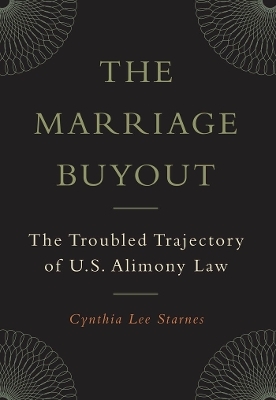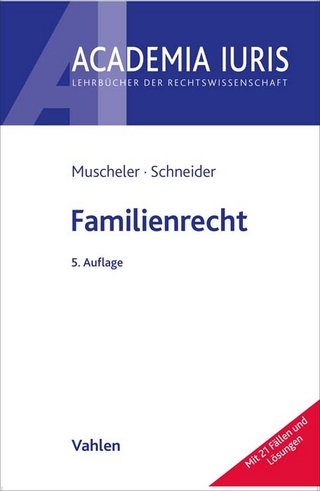
The Marriage Buyout
The Troubled Trajectory of U.S. Alimony Law
Seiten
2014
New York University Press (Verlag)
978-0-8147-0824-8 (ISBN)
New York University Press (Verlag)
978-0-8147-0824-8 (ISBN)
- Lieferbar (Termin unbekannt)
- Versandkostenfrei
- Auch auf Rechnung
- Artikel merken
From divorce court to popular culture, alimony is a dirty word. In short, critics of alimony claim it has no place in contemporary visions of marriage as a partnership of equals. The author argues that alimony is often the only practical tool for ensuring that divorce does not treat today's primary caregivers as if they were suckers.
From divorce court to popular culture, alimony
is a dirty word. Unpopular and rarely ordered, the awards are frequently
inconsistent and unpredictable. The institution itself is often viewed as an
historical relic that harkens back to a gendered past in which women lacked the
economic independence to free themselves from economic support by their spouses.
In short, critics of alimony claim it has no place in contemporary visions of
marriage as a partnership of equals. But as Cynthia Lee Starnes argues in The
Marriage Buyout, alimony is often the only practical tool for ensuring that divorce does not treat
today’s primary caregivers as if they were suckers. Her solution is to
radically reconceptualize alimony as a marriage buyout.
Starnes’s buyouts draw on a partnership model of marriage that reinforces
communal norms of marriage, providing a gender-neutral alternative to alimony
that assumes equality in spousal contribution, responsibility, and right. Her
quantification formulae support new default rules that make buyouts more
certain and predictable than their current alimony counterparts. Looking beyond
alimony, Starnes outlines a new vision of marriages with children, describing a
co-parenting partnership between committed couples, and the conceptual basis
for income sharing between divorced parents of minor children. Ultimately,
under a partnership model, the focus of alimony is on gain rather than loss and
equality rather than power: a spouse with disparately low earnings isn’t a
sucker or a victim dependent on a fixed alimony payment, but rather an equal
stakeholder in marriage who is entitled at divorce to share any gains the
marriage produced.
From divorce court to popular culture, alimony
is a dirty word. Unpopular and rarely ordered, the awards are frequently
inconsistent and unpredictable. The institution itself is often viewed as an
historical relic that harkens back to a gendered past in which women lacked the
economic independence to free themselves from economic support by their spouses.
In short, critics of alimony claim it has no place in contemporary visions of
marriage as a partnership of equals. But as Cynthia Lee Starnes argues in The
Marriage Buyout, alimony is often the only practical tool for ensuring that divorce does not treat
today’s primary caregivers as if they were suckers. Her solution is to
radically reconceptualize alimony as a marriage buyout.
Starnes’s buyouts draw on a partnership model of marriage that reinforces
communal norms of marriage, providing a gender-neutral alternative to alimony
that assumes equality in spousal contribution, responsibility, and right. Her
quantification formulae support new default rules that make buyouts more
certain and predictable than their current alimony counterparts. Looking beyond
alimony, Starnes outlines a new vision of marriages with children, describing a
co-parenting partnership between committed couples, and the conceptual basis
for income sharing between divorced parents of minor children. Ultimately,
under a partnership model, the focus of alimony is on gain rather than loss and
equality rather than power: a spouse with disparately low earnings isn’t a
sucker or a victim dependent on a fixed alimony payment, but rather an equal
stakeholder in marriage who is entitled at divorce to share any gains the
marriage produced.
Cynthia Lee Starnes is The John F. Schaefer Chair in Matrimonial Law at Michigan State University College of Law.
Acknowledgments Introduction Part I. Alimony Reflections 1. Who Cares about Alimony? 2. Alimony's Heritage: The Helpless, the Blameless, and the Clean-Break Losers 3. Alimony and Mother Myths Part II. Alimony Mechanics 4. The Contemporary State of Alimony 5. Alimony in Context: A Comparative Perspective Part III. Alimony Theory6. Reasons Matter: Alimony, Intuition, and the Remarriage Termination Rule7. The Search for a Contemporary RationalePart IV: Alimony Reform8. A Marital Partnership Model: Alimony as Buyout9. Beyond Alimony: Lovers, Parents, and PartnersConclusionNotesIndexAbout the Author
| Reihe/Serie | Families, Law, and Society |
|---|---|
| Verlagsort | New York |
| Sprache | englisch |
| Maße | 152 x 229 mm |
| Gewicht | 499 g |
| Themenwelt | Recht / Steuern ► EU / Internationales Recht |
| Recht / Steuern ► Privatrecht / Bürgerliches Recht ► Familienrecht | |
| Sozialwissenschaften ► Soziologie | |
| ISBN-10 | 0-8147-0824-2 / 0814708242 |
| ISBN-13 | 978-0-8147-0824-8 / 9780814708248 |
| Zustand | Neuware |
| Haben Sie eine Frage zum Produkt? |
Mehr entdecken
aus dem Bereich
aus dem Bereich
Ehe, Scheidung, Unterhalt, Versorgungsausgleich, Internationales …
Buch | Softcover (2024)
dtv Verlagsgesellschaft
CHF 26,45


